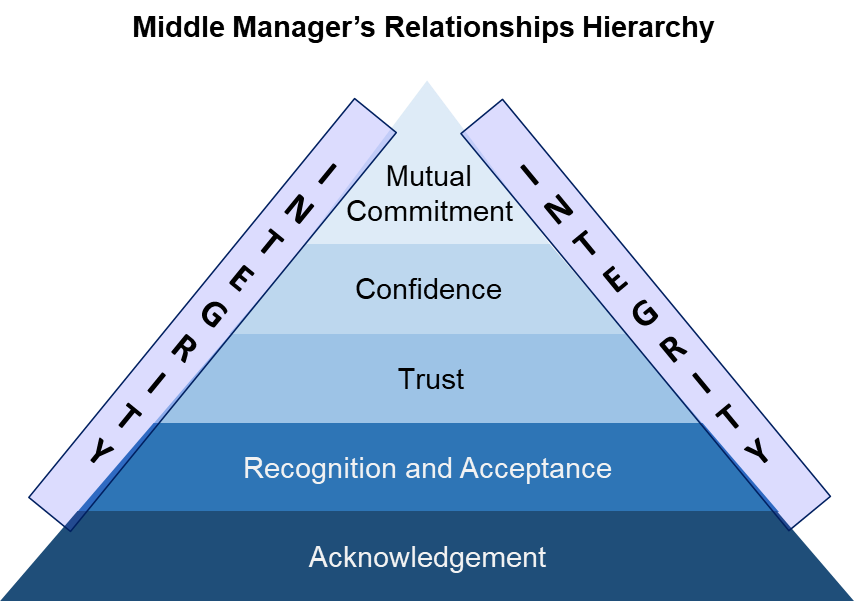A Facilitative Manager – Part 5: Demonstrate what you can’t have too much of: Integrity
By Oliver W. Cummings
May 22, 2020
To recap, in addition to a set of fundamental characteristics, (decision-making ability, assertiveness and motivation to achieve, social sensitivity, emotional stability, and appropriate self-reliance and courage levels, for example) the facilitative manager will:
- Believe, but not too much (covered in Part 1)
- Care, but not too much (covered in Part 2)
- Feel, but not too much (covered in Part 3)
- Foster trust, but not too much (covered in Part 4)
- Demonstrate what you can’t have too much of: Integrity
Each of these balancing acts is important to establish and enhance the manager’s working relationships with their subordinates.

On 02-28-2020 I posted the Middle-Manager’s Relationship Hierarchy, reproduced here with the addition of where Integrity fits. As you can see, I believe that integrity is critical to all levels of your relationship with your employees, peers, supervisors, and clients.
Integrity
Integrity is such a strong underpinning of forming and maintaining strong relationships that I thought it would be worthwhile to emphasize it again. Integrity plays a huge role in the expression of caring, sensing the deeper feelings of a person and communicating about them and in forming trust as noted in earlier posts. But integrity also makes your self-management much easier, too. First, let’s give a functional definition to integrity. I believe integrity is an abiding characteristic that a person exhibits in a congruent way in any situation or circumstance the invites other than upstanding, ethical behavior.
Integrity is equated with honesty, forthrightness, truthfulness and like terms, but it is really more than any one of these individually. Integrity is the authentic and reliable expression of sound values translated into actions in a known situation. You must spend some time knowing what you stand for. As Aaron Tippin sang in the country song, “If you don’t stand for something, you’ll fall for anything.”
And, you must walk your talk. That is what authenticity is all about. Think about your values, the company’s value system and the expectations held by your customers, employees and other co-workers and know where your limits are.
As a manager of a performance consulting group that did many surveys asking sensitive questions about topics that company executives were very interested in, I had to understand and apply standards to which I subscribed as a professional program evaluator and expected employees in my group to follow, as well. The professional standards included, for example, a commitment to hold data from individual survey respondents as confidential unless they knew in advance of answering the survey questions that their identity could be communicated to management.
In a specific instance, one of the evaluators in my unit was in possession of survey results that showed unfavorably on one of the departments involved. That evaluator came to me to say that the director of the other unit had demanded to see who said what from his unit. I had the evaluator communicate that she could not provide individual data since it was a unit policy to keep individual results from surveys such as the one in question confidential and to suggest if the director needed to follow up that I would be happy to discuss it with him.
As insurance, I then removed individual identifiers from our files for that survey in order to make it impossible for the evaluator to communicate the requested information if the request were taken further. In this case the explanation of unit policy was enough and no further request was made.
The point is, it is important to know where you will draw the line. The people who work with you also need to know that you have and will reliably exercise certain ethical standards.
Think about it.
- What is your definition of integrity?
- Would you have deleted the survey respondents’ identifying information in a situation like the one described?
- Should I have delivered the message to our client myself, rather than having the evaluator do it?
Never miss out!
Get an email update every time I publish new content. Be the first to know!
